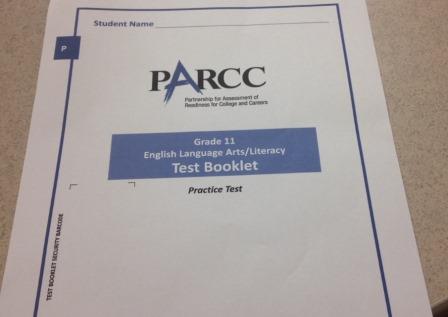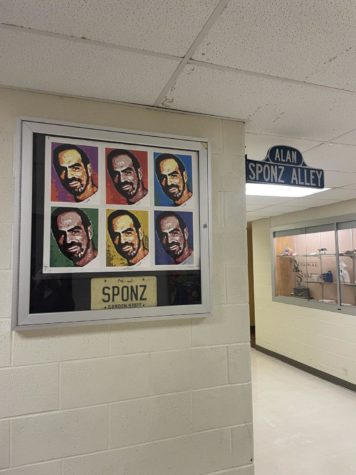Glen Rock staff looks to improve PARCC test scores

Since many of the PARCC scores were below expectations, the Glen Rock staff has been looking for ways to improve them for upcoming years.
Principal John Arlotta and Vice Principal Michael Pasciuto have been working to improve the results of the PARCC test scores at Glen Rock High School.
Since finding out that many Glen Rock students opted out of the test or failed to meet expectations, Arlotta and Pasciuto have taken action, explaining to students and parents the significance of the exam. On Thursday, September 8, the two spoke at the senior class assembly and informed students about the possible consequences for a lack of effort on the test.
“It was disappointing,” Arlotta said. “It’s certainly a test that involves a lot of planning, a lot of work on everybody’s part, and then you get this data back and I couldn’t do anything with it the first year because we had such limited people responding.”
Glen Rock is not the only school that has experienced problems with a lack of data. Schools from all over who took the PARCC test this past year are having difficulty with insufficient data. In fact, some schools are not even discussing the test results until they receive more accurate data from their students.
Following the disappointing results of the 2015 test, Arlotta, as well as some of the teachers, explained that the rumor that said that the test did not count was false. Even though the test scores and participation increased in 2016, they were still below the state average and did not meet the expectations of the district staff.
At the senior class assembly, Pasciuto told the couple hundred students sitting in front of him that those who did not meet expectations on the test would be called to his office to discuss how this score could affect them. Some students protested immediately, saying they were told that the test would not count. However, Pasciuto says that the one-on-one meetings he had with students were for the purpose of discussing the low scores that certain students received.
“In terms of the kids we called down, that was more of a fact finding for us,” Pasciuto said. “The kids that we called down-there were quite a few-there was a discrepancy between past performances on standardized tests, current placement, maybe transcripts, and then what happened.”
Some students, however, are defending their lack of effort on the test, saying that they were told the test would not count. Marina Mason, senior, says that she was told the PARCC testing last year was just a way to help the state find out if it would count in the future.
“I didn’t try on the test because I was told it had no impact on really anything other than being an experiment to see if it’s going to be used in the future,” Mason said.
Even though no students were punished for their low scores, Pasciuto still believes that it could affect them in the future. Some colleges are debating how to use this test, and Pasciuto fears that when students are being placed into courses, this test may be one of the standards that they take into consideration.
“We’ve asked a couple different schools, and we’ve had some say that they plan on using the PARCC for placement,” Pasciuto said. “A lot of community schools, or even some four-year schools, use a program called Accuplacer. Students go and take an entrance exam when they get there to see where they belong. Some schools have told us that as the consistency grows with the use of PARCC, they’re going to use the PARCC scores in place of that.”
Pasciuto also fears that students will not be prepared to explain why they refused to take the test or why they did so poorly if asked by a school.
It was disappointing. It’s certainly a test that involves a lot of planning, a lot of work on everybody’s part, and then you get this data back and I couldn’t do anything with it the first year because we had such limited people responding.
— John Arlotta
During the senior class assembly, Pasciuto enumerated the different ways that a poor PARCC score could negatively affect the students. All across the six rows of seniors were wandering eyes, as students looked around to see if others were as worried as they were. As Pasciuto finished speaking, there were a few whispers as students voiced their fears of being called down into the Vice Principal’s office.
The controversy behind the PARCC test is not news to those who have experienced the world of standardized testing in the past. Prior to the PARCC, the HSPA’s were used to determine a student’s abilities in certain subjects, much like the PARCC.
However, according to Arlotta, the HSPA’s never experienced the problem of students not trying, likely due to the fact that they needed a certain score in order to graduate. Arlotta says that even though there was controversy behind the HSPA, he was never concerned that the students were not giving their best effort.
“People didn’t like it, but there was never this thought of people not taking it. I don’t know where this happened,” Arlotta said.
Despite the scores not meeting expectations, Arlotta and Pasciuto are both confident that the problem will be resolved. In addition to the improving the scores from the prior year, Arlotta says that the 9th and 10th grade did very well compared to the state average. The two say that they will continue to encourage parents and children to take the test seriously, as they do not know how it will be used in the future.
Arlotta and Pasciuto both see benefits in the PARCC that they feel will help students on an individual effort. For example, it tests students on the same common core skills that are seen on the SAT’s and AP’s. It also exposes students to online tests, which are already used on tests like the GRE’s and may even be used on the SAT’s in future years.
Despite the negatives that may come with this test, Arlotta suggests that since all the students have to deal with it, they should always bring their best effort.
“There are reasons for this stuff,” Arlotta said. “Nobody loves the time that it takes, but if we’re going to do it, let’s do it right.“

Colin Morrow is a senior at Glen Rock High School. He plays hockey and baseball and enjoys writing about sports. This is his third year of journalism....










Scott Finan • Oct 27, 2016 at 12:06 am
go to college
Joan • Oct 7, 2016 at 7:35 am
A bill was passed that test scores can not be used for advanced placement classes and honors until at least 4 years from the inception.
The threatening of students to be kicked out of their classes was uncalled for and not ideal for Glen Rock schools. The whole assembly was uncalled for and unwarranted.
Vlad • Oct 6, 2016 at 9:23 pm
So, what is the purpose of the PARCC test, and why is principal Arlotta not able to give a compelling explanation of something that is “significant” and “involves a lot of planning”?
Vera • Oct 21, 2016 at 3:11 pm
Disturbing that the principal cannot articulate the purpose of the test. Instead he resorts to innuendo — for example, his “fear” that the test “may” affect students’ course placement in college. I find his communication style one of manipulation rather than illumination.
Liz • Oct 6, 2016 at 12:11 pm
The senior class does NOT need this test to graduate. The only classes that are now affected by it is 2020 and going further. The fact that they were going to get called down and using a scare tactic is beyond.